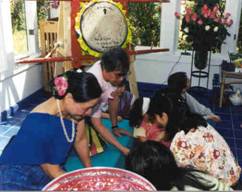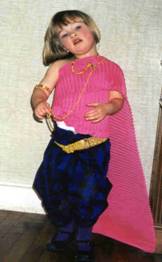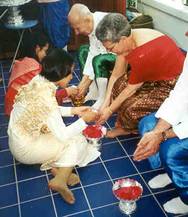Songkran Festival
Sunday, April 25, 2004
KTBF and Thai Smile Restaurant cordially invite you to join Thai Cultural festival and learn about our culture.
Date : Sunday, April 25, 2004
Time : 12:00 to 3:00 PM.
Place : Thai Smile Restaurant
19 Centre Street, Wakefield, Massachusetts 01880
Phone: 781-213-9933 Fax: 781-213-9991 Email: ktbf@thailink.com
RSVP: # of tickets
Tickets are $15 (include Thai lunch buffet and cultural show). All proceeds go to benefit of KTBF. Ticket can be purchased at the above address.
Please see all details from this brochure and press release (required Microsoft Word)
 |
April 13th, it's Songkran Day. The word Songkran is from the Sanskrit. It means the beginning of a new Solar Year. Songkran is celebrated to express delight of having another year of age passed and be prepared to enter the New Year. The festival starts on April 13th every year and lasts for 3 days until April 15th.
Songkran is not only observed in Thailand; it is also celebrated in Myanmar, Laos and Cambodia.
To the Thai people, this festival is one of water throwing and although it has religious significance, it usually turns into great fun. Everyone gets soaking wet and since it is the hottest season of the year, the custom is quite refreshing. |
To the Thai people, this festival is one of water throwing and although it has religious significance, it usually turns into great fun. Everyone gets soaking wet and since it is the hottest season of the year, the custom is quite refreshing.
On the eve of Songkran Day, housewives give their homes a thorough cleaning. Worn-out clothing or household effects and rubbish are burned, it is a Public Spring Cleaning Day, supported by the religious belief that anything old and useless must be thrown away or it will bring bad luck to the owner.
In the morning, Thai people go to the temple, which is called "Wat" to offer food to the monks. It is a feast day, special exotic foods are made. Music is often played all day while the people enjoy playing games and dancing.
Songkran custom is also a religious service in memory of the dead. In some places, people bring bones of deceased to the Wat. Monks officiate at a ceremony wherever ashes or bones of dead have been deposited. During the afternoon of the 13th, Buddha images are bathed as part of the ceremony. Young people pour scented water into the hands of elders and parents as a mark of respect while seeking the blessing of the elders. In ancient days, old people were actually given a bath and
clothed in new apparel presented by the young folks as a token of respect for the New Year.
Another unique Songkran custom is the releasing of live birds and fish purchased in the markets. It is believed that great merit is gained through this kind act. In Paklat (Phra Pradaeng), near Bangkok, particularly, beautiful girls in bright and cheerful color dress form a procession and carry fish bowls to the river where the fish are released. Naturally, young men of Bangkok like to make a trip to Paklat every year. |

|
The releasing-of-fish custom goes back to the days when the Central plains of Thailand were flooded during the rainy season. After the water subsided, pools were left. As the pools gradually dried up, baby fish were trapped. Farmers in those days caught small fish and kept them at home until Songkran Day to release them into the canals, thereby gaining merit with mother nature as well as preserving one of the main items of their diet.
The country people usually celebrate the Songkran Festival but the merriest celebration of all is held in Chiang Mai, the second largest city in Thailand some 500 miles north of Bangkok.
 |
If a visitor happens to be in a village, out on a country road or up in Chiang Mai, he can expect to be drenched with water. Everybody, particularly the younger ones, throw water on one another during the three-day holiday.
In Chiang Mai, there are processions of beautiful girls (one of Chiang Mai's claims to fame), dancers, floats and bands playing. A Queen of the Water Festival is chosen amidst much noise and gaiety. The river, which runs thorough the city, is crowded with people wading in the water and scooping it up with pans and buckets to throw in one another. The visitor to Chiang Mai must plan his trip well in advance as the city is
crowded with merrymakers during the Songkran Festival.
Certain areas of the Kingdom have their own unique types of games, songs and dances to celebrate the Festival. It is only natural that the farmers make more celebration as their farm work is at a stand-still, until the rain comes, that is when they can begin plowing for the new rice crop. |
It is an old belief that the Nagas or mythical serpents brought on rain by spouting water from the seas. The more they spouted, the more rain there would be. So, one might believe that the Songkran customs, of throwing water is actually a rain-making idea, the same as in Europe where water is thrown on the last crop of corn on the farmer bringing in the last load of corn, in the hope of having ample rain for the next year's crops.
Let's Celebrate Thai New Year, Songkran !!! Come to have fun with us.
Acheived Picture Albums
• Songkran Festival 2002 at KTBF at 15 Given Drive Burlington, Massachusetts 01803
• Songkran Festival 2001 at KTBF at 15 Given Drive Burlington, Massachusetts 01803
|
|
